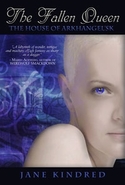
 I didn’t expect to be writing novels about the unjust persecution of misunderstood monarchs. It sort of just…happened. I blame THE SCARLET PIMPERNEL. I loved that story as a girl; I loved the 1934 movie with Leslie Howard and Merle Oberon on the late-night movies, and I loved the made-for-TV movie in the 80s with Anthony Andrews and Jane Seymour, and I loved the 90s version with Richard E. Grant and Elizabeth McGovern that I recently stumbled upon on Netflix. (And just about died of swoonage at the line Grant delivers to McGovern at the end, when Sir Percy realizes he’s in love with his wife; as they’re going in for the romantic final kiss, she says something that ends with “…in a word, marriage,” and he replies in his fabulously perfect foppish drawl, “Marriage i’n’t a word, it’s a sentence.”)
I didn’t expect to be writing novels about the unjust persecution of misunderstood monarchs. It sort of just…happened. I blame THE SCARLET PIMPERNEL. I loved that story as a girl; I loved the 1934 movie with Leslie Howard and Merle Oberon on the late-night movies, and I loved the made-for-TV movie in the 80s with Anthony Andrews and Jane Seymour, and I loved the 90s version with Richard E. Grant and Elizabeth McGovern that I recently stumbled upon on Netflix. (And just about died of swoonage at the line Grant delivers to McGovern at the end, when Sir Percy realizes he’s in love with his wife; as they’re going in for the romantic final kiss, she says something that ends with “…in a word, marriage,” and he replies in his fabulously perfect foppish drawl, “Marriage i’n’t a word, it’s a sentence.”)
Okay, so maybe that says more about how I have a thing for somewhat effeminate men with foppish drawls, but that’s a story for another time.
It was while watching THE SCARLET PIMPERNEL that I had this twinge of guilt: I was rooting for the French aristocracy. Shouldn’t I have been on the side of the poor and oppressed? Shouldn’t I feel downright evil for loving THE SCARLET PIMPERNEL?
And then I got to thinking about the world of my first novella, THE DEVIL’S GARDEN, and how the divine monarchs are wronged during a violent revolution. Well, it’s one little story, I told myself. It’s not like I—and then I remembered my upcoming novel THE FALLEN QUEEN was inspired by the tragedy of the murdered Romanov family during the Bolshevik Revolution. (So okay, maybe I didn’t actually forget this little detail; let’s say it was a repressed memory. For five seconds.)
InTHE FALLEN QUEEN, Book One of The House of Arkhangel’sk series, my fallen angel Anazakia is the sole survivor of a celestial coup that fuels a demon uprising. Since the pair of demons who hide her in the world of Man feature prominently in this story, you’d think perhaps I’d be on the side of the revolutionaries. But as with the Romanovs themselves, my sympathies lie with the murdered rulers. They may have been flawed, but they didn’t deserve to be slaughtered.
That was when I realized it: I am a wicked, wicked monarchist.
So what is it with me siding with the ruling class of an outdated and oppressive form of government against the peasants who suffered under it? It isn’t that I think the peasants were wrong to resist oppression or that those monarchies should have remained in place (though I won’t deny there’s something romantic about royalty; I didn’t watch the most recent British royal nuptials, but I got up at 3:00 a.m. to watch Charles and Di’s wedding live when I was a kid).
I suppose what it comes down to is that in all of these cases, it wasn’t just governments being overthrown, it was individuals being blamed for all the ills of their societies and then being brutally murdered as scapegoats. It’s the people caught up in situations beyond their control—like Tsar Nicholas and his Alexandra, and their four daughters and son murdered with them—who tug at my heart.
Perhaps my sympathies are misplaced, but I’ve always found these events in history deeply tragic. And tragedy, well—to me, it’s always the beginning of a great story.
Whether you’re a dirty monarchist like me or it’s vive la revolution all the way, I’d love to hear about your favorite stories of class and conflict.THE COUNT OF MONTE CRISTO andTHE MAN IN THE IRON MASK are some others I’ve always adored. TELL ME YOURS AND I’LL PICK ONE COMMENTER AT RANDOM TO WIN A SIGNED ARC OFTHE FALLEN QUEEN.
* * *
Heaven can go to hell.
Until her cousin slaughtered the supernal family, Anazakia’s father ruled the Heavens, governing noble Host and Fallen peasants alike. Now Anazakia is the last grand duchess of the House of Arkhangel’sk, and all she wants is to stay alive.
Hunted by Seraph assassins, Anazakia flees Heaven with two Fallen thieves—fire demon Vasily and air demon Belphagor, each with their own nefarious agenda—who hide her in the world of Man. The line between vice and virtue soon blurs, and when Belphagor is imprisoned, the unexpected passion of Vasily warms her through the Russian winter.
Heaven seems a distant dream, but when Anazakia learns the truth behind the celestial coup, she will have to return to fight for the throne—even if it means saving the man who murdered everyone she loved.
* * *
Jane Kindred began writing fantasy at age 12 in the wayback of a Plymouth Fury—which, as far as she recalls, never killed anyone…who didn’t have it coming. She spent her formative years ruining her eyes reading romance novels in the Tucson sun and watching Star Trek marathons in the dark. Although she was repeatedly urged to learn a marketable skill, she received a B.A. in Creative Writing anyway from the University of Arizona.
She now writes to the sound of San Francisco foghorns while two cats slowly but surely edge her off the side of the bed.
You can find Jane on Twitter: @JaneKindred on Facebook or on her website
To comment on Jane Kindred’s blog please click here.


One Comment
The Fallen Queen blog tour - Somewhere Between Heaven and Hell